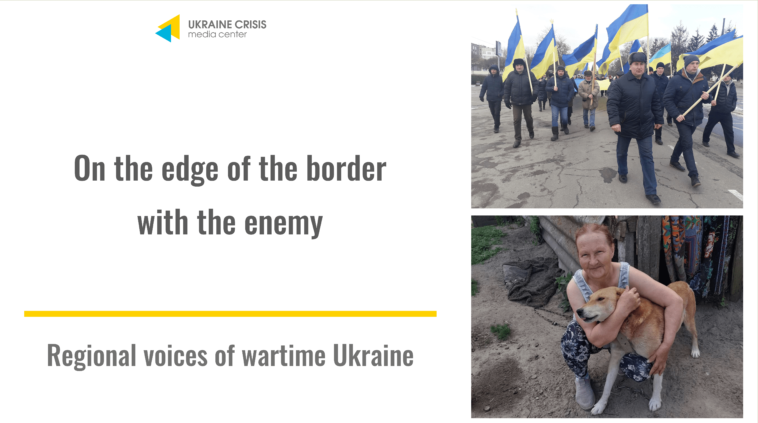Apart from life and health, the Russians deprive Ukrainians of their homes, uproot them from their familiar environment and make them look for a safe place elsewhere. People go to places where Russian death cannot reach. Starting over is hard, but millions simply have no other option. Today, our story is about the trials that people living in the border areas of the Chernihiv region have to go through. This is a story about pain, but also about empathy and mutual help, which do not allow Ukrainians to give up.
On February 24, 2022, at four in the morning, the border town of Horodnia in the Chernihiv region was awake. Scared people went out into their yards, stuck their heads out of the windows and anxiously listened to the explosions and shots coming from the border.
Two hours later, convoys of foreign military vehicles moved through the streets. The town and its outskirts were crowded with tanks, armored personnel carriers, fuel trucks and other Russian military vehicles. They circled the streets of the town and nearby villages, often getting lost. The road to Chernihiv was blocked, as well as to other towns and villages in the region. Loud explosions were heard from the regional center. Horodnia forgot about peace…
People shuddered at every loud bang. They set up basements in private houses and high-rise buildings, took food, water, chairs, blankets and mattresses there.
On February 26, after particularly heavy explosions, it became clear that it was already on the outskirts of Horodnia. Lisova Street, which is near the hospital close to the forest, came under fire. There was fire and smoke, fear and tears in the town.

People began to organize public order protection units, because there were no military or law enforcement structures left – they were all ordered to retreat to Chernihiv, where the battle front unfolded. Horodnia was left under occupation – without electricity, heat and communication. People got used to not turning on the lights in the dark, sleeping with their clothes on and waking up in the middle of the night to the frantic hum of aircraft.
A team of electricians went to a border village to restore the power supply that had disappeared after enemy shelling. Communication with them was lost. The town was shaken by the news: they were captured by the Russians and taken outside Ukraine.
There was no communication with many villages. People made guesses by the sounds of explosions: “It’s somewhere from Horoshkivka. And this is from where Sedniv is.” When people heard the roar of aircraft in the sky, they whispered: “They are flying to bomb Chernihiv again”… A few days later, the flow of Russian vehicles through the town decreased, because the occupiers were afraid of partisans, so they began to move around the suburbs and villages. Despite the threats and demands of the enemy soldiers not to resist, people did not hold back and took to the streets unarmed, blocking the roads with themselves and thus stopping or reversing the convoys. Trees were cut down and felled on all the roads to block the enemy’s way to Chernihiv.

On March 9, the townspeople gathered for a rally dedicated to Taras Shevchenko’s birthday. Only this time the event turned into a protest. Even though armed invaders were brought to gymnasium No. 1, people did not hold back their emotions and, proudly carrying national flags, chanted: “Glory to Ukraine! Glory to the heroes! Death to the enemies! Ukraine is above all!”

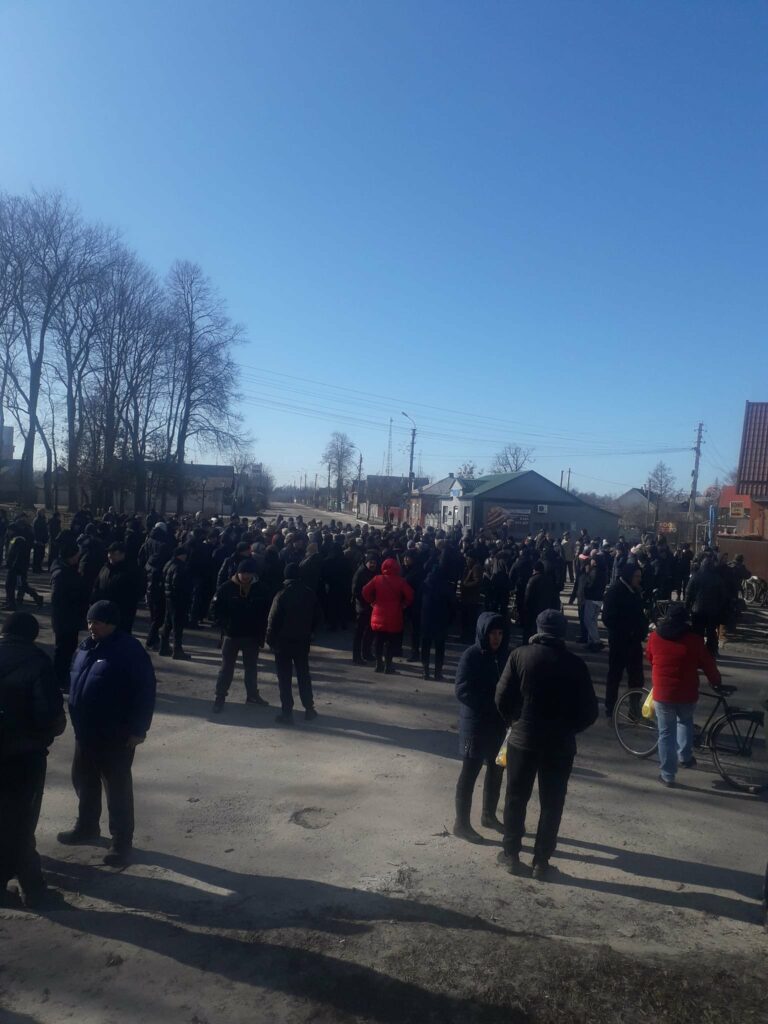
The occupation lasted until March 31, 2022. On that day, people in Horodnia watched as enemy vehicles began intensive movement in the opposite direction – towards the border. Are they leaving? Tears of joy mixed with disbelief. People crossed themselves and prayed, unable to believe in their own happiness. But the smell of freedom was already in the air. Slowly, like a wounded animal, Horodnia recovered from the enemy invasion. When soldiers of the Ukrainian Armed Forces entered the town, they were greeted with tears of joy and pride. Even the youngest townspeople shouted happily: “Glory to Ukraine!”
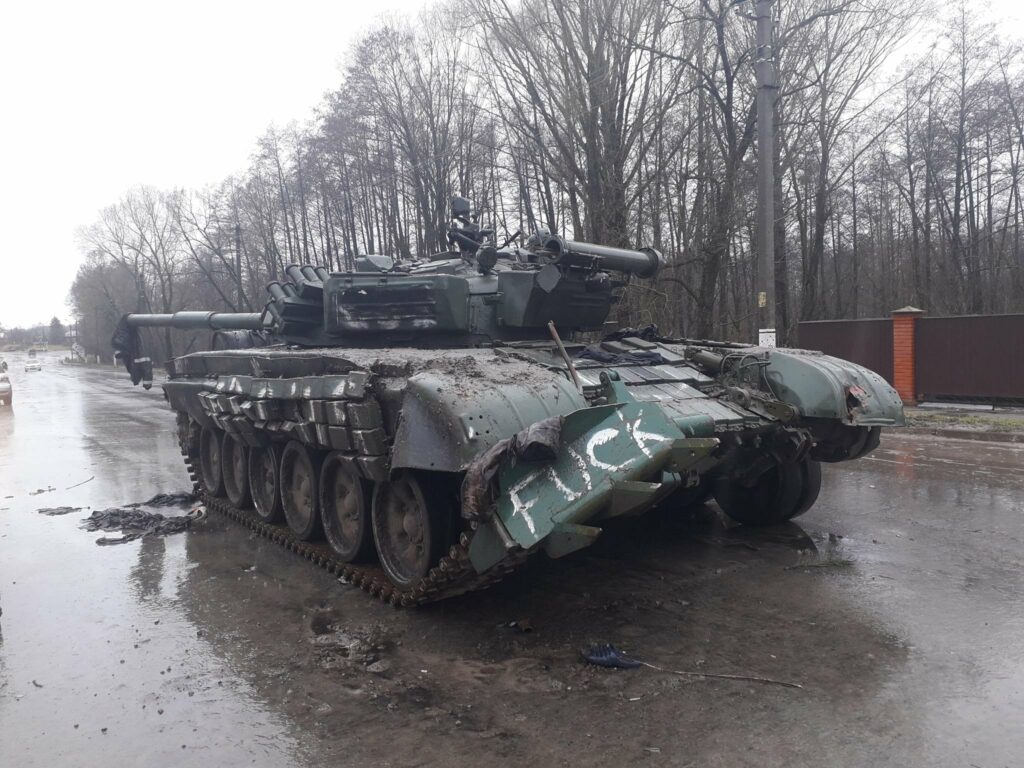

In the spring, people in the liberated territory began to actively restore infrastructure and plant gardens, hoping that the horror would not be repeated. But, having retreated behind the border, the enemy began destroying border villages with merciless shelling. People whose lives turned into hell had to leave their homes and seek refuge where enemy shells could not reach. One such woman now lives in the village of Dibrivne in the Horodnia community of the Chernihiv district. Her story is full of pain, but not without faith in the future, which is given by the mutual aid and support of Ukrainians in this war.
Valentyna Khomivna Veselova will turn 62 in July. She has spent almost all of her conscious life, with the exception of a short period, in her home village of Khrinivka in the border area in the Chernihiv region. A picturesque village, hidden in the forests of Polissia, is located two kilometers from the once international “Senkivska highway” (H 28 – ed.), which led to the infamous monument with the already sarcastic name “Three Sisters”. And it is only about two kilometers from there to the intersection where the borders of Ukraine, Russia and Belarus meet. On the first day of the all-out war, Khrinivka was among the first to come under the enemy merciless artillery fire.
Life was tough for Valentyna – it so happened that she raised all of her six children almost single-handedly. The children grew up and moved away. But all the siblings are very friendly, united and never left their mother alone – someone from a large family would always visit her house. They could have lived and been happy. But the Russians didn’t let them…
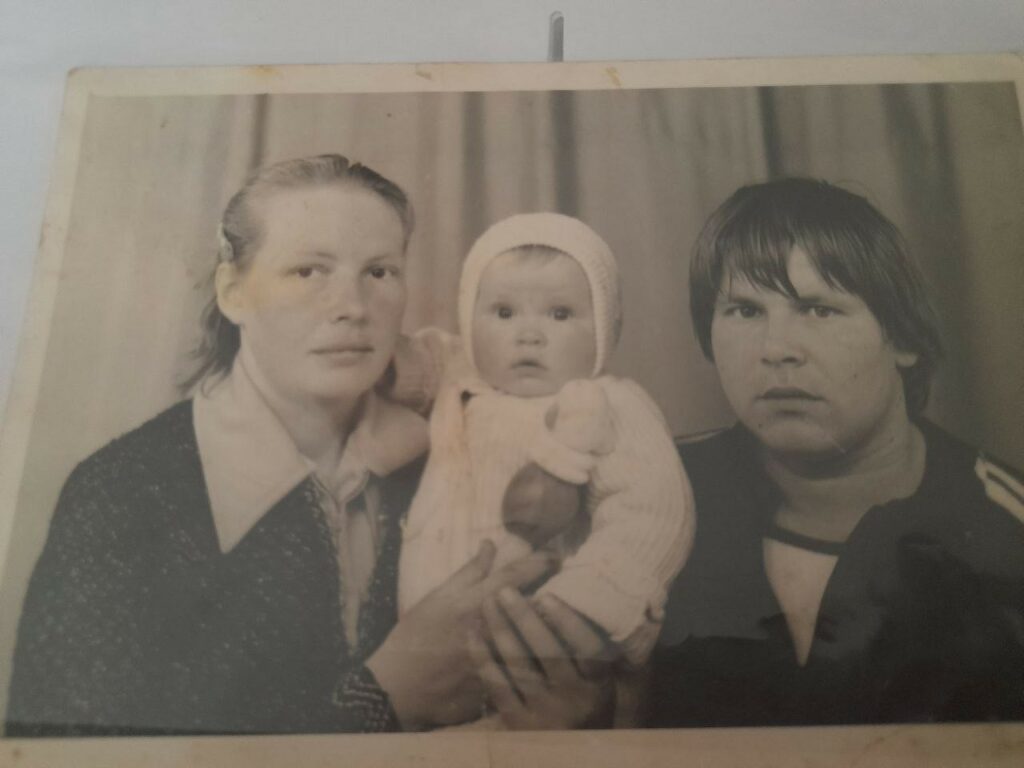
– It was still dark that morning. I felt the bed suddenly shake, – says Valentyna. – I jumped up and went to the window. I thought it was a thunderstorm. Then I remembered the warning and alarming news on TV about the possible invasion. My soul went cold. I was afraid to turn on the light, because everything around was shaking, whistling, rattling. I somehow managed to put on my clothes and ran to my daughter Oksana, who also lived with her family in Khrinivka. Her husband was working in Kyiv, and she had a little child – my grandson Dania was four years old. My daughter grabbed the documents, medicine, and something else, and we all returned to my house. I told the kid: “My dear, they aren’t shooting, it’s a thunderstorm. It’s God scolding us.” He asks: “Will it rain?” “Yes, it probably will,” I tell the child, shaking all over, I look out the window – the dog is trembling with fear. We took documents, blankets, everything more or less valuable to the cellar. The first time we stood on the stairs for more than three hours. Oksana held her little son close to her, and they stood there hugging each other and frozen with horror for a long time, until the cannonade subsided a little.
The woman recalls that when the shelling subsided, she could hear an incessant sound of vehicles on the “Senkivska highway” – the enemy army was moving towards Horodnia and Chernihiv:
– The enemy was not stationed in our village – the Russians only came here every day, reconnoitering the situation, asking if there were any ATO veterans or soldiers in Khrinivka. Our women would cross themselves, as if to ward off evil spirits, and answer: “What men can be here, in the outback, in a dying village? Only weak elderly women are left here.” The intruders believed. And all my children had already gathered in my house – they got there across bombed-out bridges, crossings, bypassing with the help of volunteers. Only Yurko, the youngest, came after the Chernihiv region was liberated, and Serhiy and his family stayed in Horodnia. The rest are all with me. I was afraid for them – what if the intruders decided to break into my house? The Lord was merciful…
Valentyna Khomivna says that the Russians tried to make the villagers take humanitarian aid from them – they brought some food and medicine to the village. But people refused to take those “gifts”.
– I used to go through the forest to the field to fetch some corn for my chickens, – she says. – We did it every year – after the combine harvester had passed, there were still some corncobs left on the ground. People used to collect them for livestock. I decided to do it when it seemed to be quiet. When I came, the Russian artillery began firing on the field where the corn was. I had to run away. I didn’t want to leave the bag with corncobs, so I ran to the forest with that bag. Somehow I got to the village. And all of a sudden, the occupiers jump out with a machine gun and ask: “Whose monument is this?” And my Maryna came out and said: “Haven’t you learnt history?” They didn’t ask anything else and began persuading us to take their humanitarian aid: “Take it, take it, we brought you food.” And I turned round and said: “You called yourselves our brothers. What are you doing? No, thank you, we don’t eat other people’s food!” After that incident, I didn’t leave the house when they appeared in the village.
When the Russians retreated to their territory, they began to take bloody revenge on civilians for their shameful defeat on the battlefield. The shelling of the village was constant, getting more and more intense every day. In many houses, windows and even doors were blown out by the explosions, roofs were damaged with debris. People gradually began to leave the village, fleeing the horrors of war. Valentyna Khomivna’s daughter Oksana and her younger son were the first to leave for Horodnia. Her husband and brother Yuri immediately went to the military commissariat. Her brother Serhiy was also mobilized. Now they are all fighting in the Armed Forces, defending the country from the enemy. Oksana’s eldest son, who was in military service at the time of the full-scale invasion, signed a contract with the army despite his mother’s request. The boy is 22 now, and he, like his father and uncles, is bringing victory closer with arms in hand. Oksana understands the choice of her men and cannot stand aside either. She has joined a powerful volunteer movement in the Horodnia district and weaves camouflage nets for the defenders.
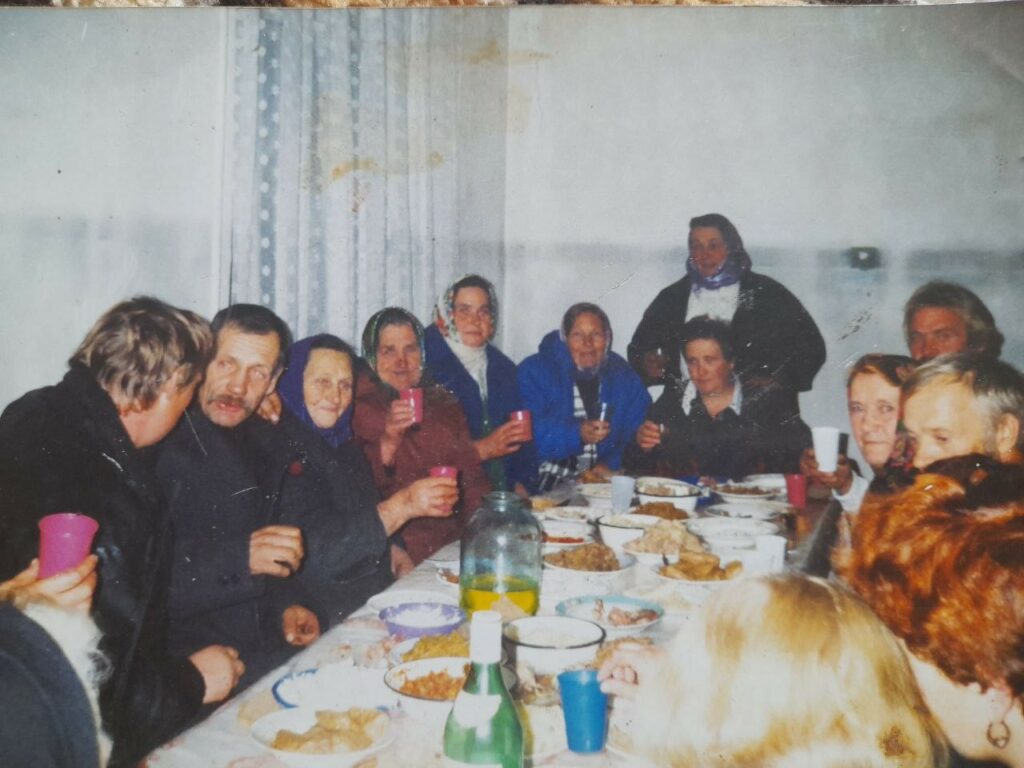
Finding herself alone in her house again, Valentyna Khomivna understood that sooner or later she would have to leave her damaged home. Her thirty-year-old son Yuri, who was in the war zone and worried about his mother, began to look online for a place to live in one of the villages in the Horodnia district, which does not suffer from constant shelling. He found such a house in Dibrivne.
– My youngest son, Bohdan, came here, to Dibrivne, and put things in order in the new home, – says the woman. – We tried to take at least some necessary building materials from Khrinivka – bricks, for example. For this purpose, we dismantled the stoves under shelling. But we couldn’t take everything away – it was dangerous to carry it because of heavy air strikes. We, like all residents of Khrinivka and Klyusy, were helped to leave by a man from Horodnia. His name is Serhiy; I don’t know his last name. He actually evacuated all two villages by himself. While it was calm, we moved a goat and a goatling, and about three dozen chickens. A cat, two dogs. A little firewood. The grain that we managed to harvest and onions. We made four or five trips. I was still in my house, while Bohdan was doing repairs here. And then terrible cannonades began. That was horrible – not so scary in the daytime, but at night I was numb with fear. I would take off my clothes and put them back on. You wondered whether you would survive or not.Valentyna sat behind the closet for several hours and understood that she could no longer stay in the village – if they didn’t kill her, she would be paralyzed with fear. In early spring
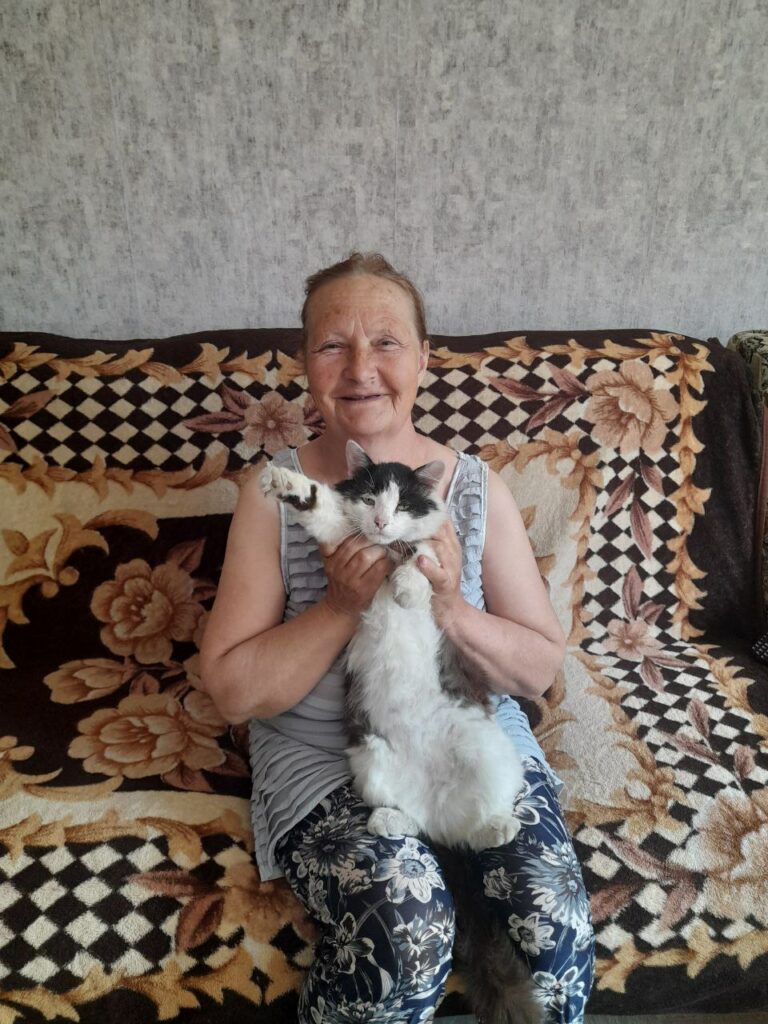
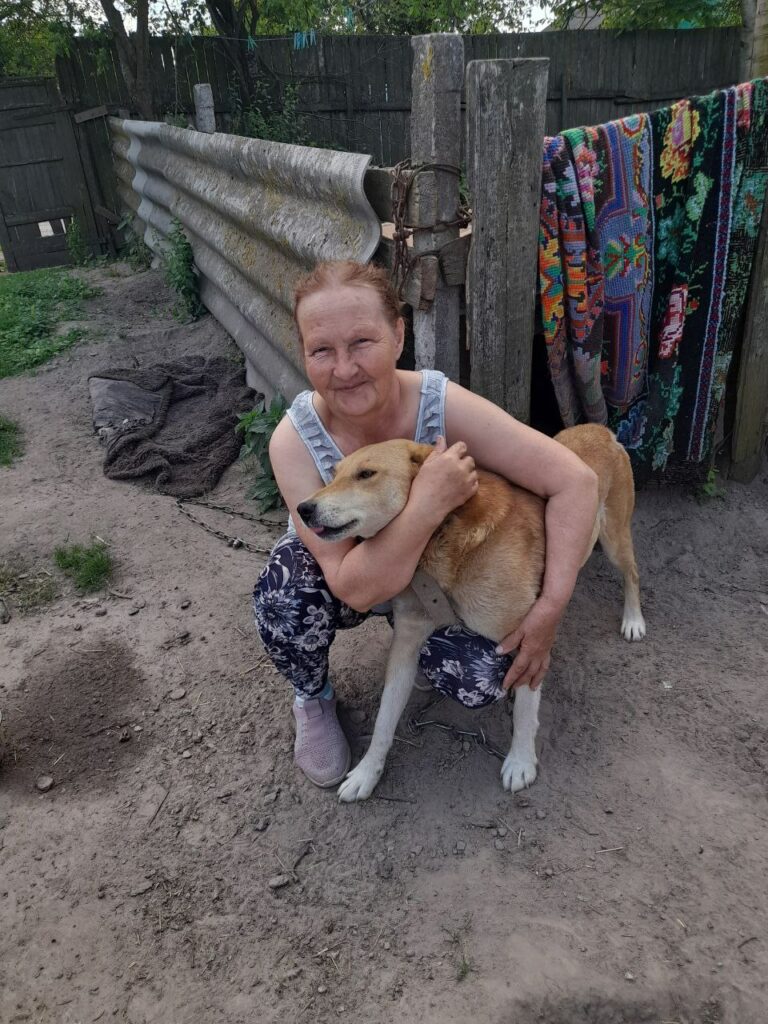
We were welcomed here, in Dibrivne, – says Valenyina Khomivna. The neighbors are kind and friendly, and the village head Yulia Novyk always supports us. We were provided with humanitarian aid – mattresses, kitchenware, and financial aid more than once. They replaced the windows and bought firewood, and gave us 14 hundred square meters of vegetable garden. But I had forty in Khrinivka… I miss Khrinivka… Our house was still intact when we left. And now, they say, both the windows and the frames are gone. My soul is pining for my home. I have nowhere to go back to. The villains even bombed the cemetery, they were not afraid to disturb the dead. I see that on memorial days people here go to the cemetery with their whole families. And my heart aches that I won’t even get to my family’s graves… But life goes on, although the war has changed it so much, that we’ll never be different. And no matter how much my soul aches for Khrinivka, I won’t return there. It’s very close to the border with the enemy… the enemy who used to call himself a brother …
Author: Svitlana Tomash
*All photos are provided by the author of the material
Conducted as part of the project with the support of the U.S. Embassy in Ukraine. The authors’ views do not necessarily coincide with the official position of the U.S. government.

